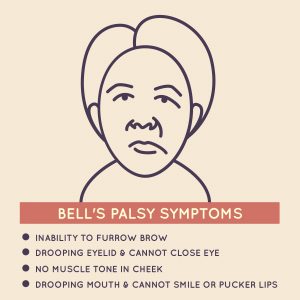
Bell’s palsy is a condition that causes sudden weakness in the muscles on one side of the face. In most cases, the weakness is temporary and significantly improves over weeks. The weakness makes half of the face appear to droop. Smiles are one-sided, and the eye on the affected side resists closing.
Bell’s palsy is also known as acute peripheral facial palsy of unknown cause. It can occur at any age, and the exact cause is unknown. Experts think it’s caused by swelling and nerve inflammation that controls the muscles on one side of the face. It could be caused by a reaction that occurs after a viral infection.
Symptoms usually improve within a few weeks, with complete recovery in about six months. A small number of people continue to have some Bell’s palsy symptoms for life, and rarely Bell’s palsy occurs more than once.
Symptoms
Signs and symptoms of Bell’s palsy come on suddenly and may include:
- Rapid onset of mild weakness to total paralysis on one side of your face — occurring within hours to days
- Facial droop and difficulty making facial expressions, such as closing your eye or smiling
- Drooling
- Pain around the jaw or in or behind your ear on the affected side
- Increased sensitivity to sound on the affected side
- Headache
- A loss of taste
- Changes in the number of tears and saliva you produce
In rare cases, Bell’s palsy can affect the nerves on both sides of your face.
Causes
Although the exact reason Bell’s palsy occurs isn’t apparent, it’s often related to having a viral infection. Viruses that have been linked to Bell’s palsy include viruses that cause:
- Cold sores and genital herpes (herpes simplex)
- Chickenpox and shingles (herpes zoster)
- Infectious mononucleosis (Epstein-Barr)
- Cytomegalovirus infections
- Respiratory illnesses (adenovirus)
- German measles (rubella)
- Mumps (mumps virus)
- Flu (influenza B)
- Hand-foot-and-mouth disease (coxsackievirus)
The nerve that controls facial muscles passes through a narrow corridor of bone on its way to the face. In Bell’s palsy, that nerve becomes inflamed and swollen — usually related to a viral infection. Besides facial muscles, the nerve affects tears, saliva, taste, and a small bone in the middle of the ear.
Risk factors
Bell’s palsy occurs more often in people who:
- Are pregnant, especially during the third trimester, or who are in the first week after giving birth
- Have an upper respiratory infection, such as the flu or a cold
- Have diabetes
- Have high blood pressure
- Have obesity
Recurrent attacks of Bell’s palsy are rare. But when they do recur, there’s often a family history of recurrent attacks. This suggests that Bell’s palsy might have something to do with your genes.
0 Comments